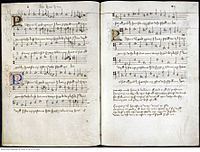Pastime with Good Company

Original score: Pastime with Good Company (c. 1513), in the possession of the British Library , London
Pastime with Good Company , also known as The King's Ballad ( The Kynges Balade ), is an English folk song written by King Henry VIII in the early 16th century shortly after his coronation. The composition is considered to be his most famous work. It is believed that it was dedicated to Catherine of Aragon .
text
| original | English | German |
|---|---|---|
| 1 | ||
| Pastyme with good companye | Pastime with good company | Pastime with good company |
| I love & sthalt vntylt I dye | I love and shall until I die. | I love and and I should [love him] until I die. |
| I love & sthalt tyl I dye | ||
| I love & sthalt do tyl I dye | ||
| gruche who lust but none denye | Grudge who lust, but none deny | Whoever wants to envy, but nobody [will] deny |
| so god be plesyd yns lene wylt I | So God be pleased, thus live will I. | in this way be delighted to God and in that I will live. |
| for my pastance | For my pastance | For my pastime |
| hunt syng & dance | Hunt, sing, and dance. | to hunt, sing and dance |
| my hard is sett | My heart is set | is my heart aligned: |
| old goodly sport | All goodly sport | [to] every respectable sport, |
| for my comfort | For my comfort: | who [is] for my good |
| who stop me let | Who shall me let? | who should let me [who (not) drift]? |
| 2 | ||
| youthe must have sum Daliance | Youth must have some dalliance, | Youth must have a little play with love |
| off good or ylt sum pastance. | Of good or ill some pastance; | for better or for worse, some pastime; |
| Company me thynkes then best | Company methinks then best | Community seems best to me |
| old thoughts & fansys to deiest. | All thoughts and fancies to digest. | (to) process all thoughts and whims. |
| ffor Idillnes | For idleness | Because inaction |
| is cheff mastres | Is chief mistress | is the supreme master |
| of vices old | Of vices all. | of all vices. |
| then who can say. | Then who can say | So who can say |
| but myrth and play | But mirth and play | something other than happiness and play |
| is best of old. | Is best of all? | be the best of all? |
| 3 | ||
| Company with honeste | Company with honesty | Honorable company |
| is vertu vices to ffle. | Is virtue, services to flee. | holds the power to escape vice. |
| Company is good & ill | Company is good and ill, | Community is good and bad |
| but evry man hath hys fre wylt. | But every man hath his free will. | but every person has his own free will. |
| the best ensew | The best ensue, | To follow the best, |
| the worst esthew | The worst eschew, | avoid the worst, |
| my mynde sthalbe. | My mind shall be; | shall be my mind; |
| vertu to vse | Virtue to use, | To use proficiency, |
| vice to refuce | Vice to refuse, | To avoid vice, |
| thus sthall I vse me. | [thus] I shall use me. | should I (therefore) commit myself. |
Comment on the second line of the first stanza: the three voices of the original sentence have text deviations here.
Note on the third line of the third stanza: a symbol used here differs so far from the symbols used before that it can also be assumed that "or" is not meant here, which would be very consistent in terms of content. The German translation tries to take this into account.
Individual evidence
- ^ Pastime with Good Company | Henry VIII. | Philip Sparke | RUNDEL publishing house. Retrieved December 5, 2017 .
- ^ John Kilpatrick: Pastime version 1 a free music notation, accessed September 5, 2019